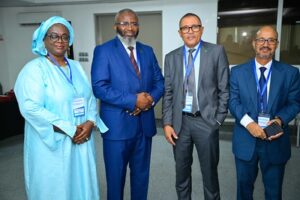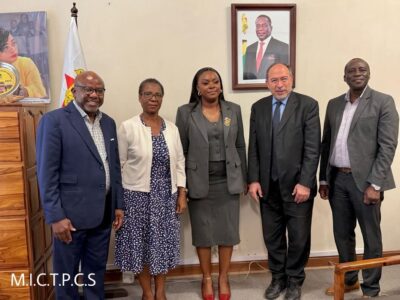By Ross Moyo
Minister of Women’s Affairs, Small and MEDIUM Enterprises, Monica Mutsvangwa is lifting the voice and women’s place in Zimbabwe on various fora across the world and more recently in North Africa.She recently shared notes with her counterparts who took part in the United Nations Economic Commission For Africa’s (ECA) Office for North Africa who just concluded a two-day, high-level policy dialogue on small and medium enterprises (SMEs) in North Africa in Rabat, Morocco.

According to the Ministers present and UN,
“This meeting allowed us to discuss policy issues and explore how they can create an enabling environment for SMEs to contribute more significantly to North Africa’s economic transformation by enhancing resilience, access to finance, sustainable growth and leveraging opportunities provided by the AfCFTA,”said Adam Elhiraika, Director of the ECA office for North Africa.
The high-level dialogue was the culmination of a two-year programme initiated by the ECA Office for North Africa. Over the course of this project, the office has organized a dozen workshops for the benefit of Libyan, Mauritanian, Moroccan and Sudanese women-led enterprises, on topics such as access to finance, markets, digitalization and climate-related challenges.
SMEs are the backbone of the economy. Currently about 50% of them survive their first five years of existence, which is a strong figure although it may appear otherwise, said Moroccan Minister of Industry and Trade Riad Mezzour who described the policies implemented by Morocco in support to SMEs in areas such as access to public markets and certifications, better payment terms and greening.
Women-led enterprises in North Africa can significantly contribute to economic growth and diversification, job creation, and inclusive development. However, numerous obstacles including limited access to finance, property, markets and networks, limit their capacity to grow and access markets. These constraints often restrict them to smaller markets and the informal sector, limiting their growth potential and access to trade opportunities.
“In Morocco, SMEs account for 86% of formal employment, yet women lead only 15.3% of newly created enterprises and only slightly more than 12% of them are at leadership positions,” said Eric Falt, Director of the UNESCO office for the Maghreb.
Senior officials from Libya, Mauritania and Morocco took part in the policy dialogue, aiming to identify and recommend policies to strengthen North African SMEs’ resilience to economic and climate shocks.
Key topics discussed included how SMEs can contribute to economic diversification and gender inclusiveness; financing opportunities and innovations for SMEs in North Africa; climate adaptation; the impact of policy distortions on SME productivity, Innovation and integration into global value chains.













Comments